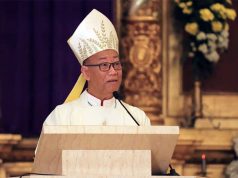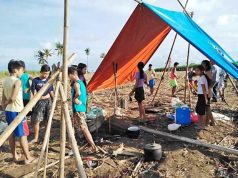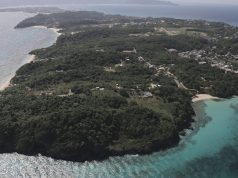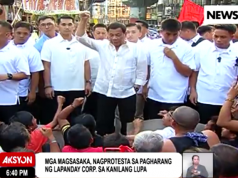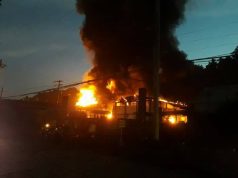
TAGUM CITY, Philippines (Thomson Reuters Foundation) — A dozen bamboo and tarpaulin tents are pitched on the pavement, festooned with washing and banners—the department in charge of agrarian reform in Tagum City is sporting a new facade.
Inside the tents there are hammocks, boxes of groceries and cooking vessels, presenting a tranquillity that belies the urgent appeals on banners demanding land for peasants, and an end to the killing of farmers on the island of Mindanao.
Peasant farmers and leaders in the camp say they want genuine reform, as the government’s agrarian reform programme, known as CARP and enacted in 1988, has failed.
“Thirty years after the law was passed, land has not been given to peasant farmers who have tilled the land for generations,” said Lito Lao, chairperson of the agricultural workers’ union in Mindanao, known by its Tagalog acronym UMA.
“Instead, farmers are getting killed for demanding their right to land, and dummy beneficiaries have been settled by landlords on land meant for the landless,” he said.
CARP, signed into law by then president Corazon Aquino, was initially set for 10 years, with an aim to distribute about 7.8 million hectares of land—roughly the size of Portugal—to reduce inequality and help alleviate poverty.
In 1998, the programme was extended by another 10 years. In 2009, Gloria Arroyo, who was president, unveiled CARPER, adding an Extension with Reforms to CARP and a deadline of 2014.
Of a total area of 5.4 million hectares that fell under CARP’s scope, the government has distributed 4.8 million hectares as of December 2017, according to a spokesman for the Department of Agrarian Reform.
Activists say officials accepted thousands of fraudulent claims, and that about 44 percent of land distributed is public, requiring farmers pay to an amortisation fee they say is excessive.
Colonial legacy
Land reform has long been a contentious issue in the Philippines, where a lasting legacy of Spanish colonial rule was a concentration of ownership among a wealthy few.
Large corporations came to control the bulk of farm land for plantations of coconuts, bananas and pineapples.
Matters came to a head in 1987, when the military attacked peasants marching in Manila, killing more than a dozen.
Enacted the following year, CARP allowed land owners to retain up to five hectares, in addition to three hectares for each heir. The state would acquire the remainder for distribution among the landless.
But inaccurate and missing land titles slowed acquisitions, according to DAR. Landowners filed petitions for exemptions, or installed fraudulent beneficiaries on their land, activists say.
“Landlords and corporations who own large holdings are a powerful lobby, so acquisition of private lands fell well below target.”
“Landlords and corporations who own large holdings are a powerful lobby, so acquisition of private lands fell well below target,” said Marlon Manuel, an advisor to the legal advocacy group Namati.
“Where land was distributed, there were no other services like funding or marketing. The farmers had little experience in managing land, and many of them ended up leasing or selling the land and finding themselves landless again,” he said.
An official at the provincial DAR office in Tagum City said all qualified beneficiaries had been identified, and that distribution is still underway.
“There is a procedure to become an Agricultural Reform Beneficiary (ARB), and we believe it is nearly perfect. Those who say they did not receive land – perhaps they did not qualify,” Jocelyn Seno said in an interview in her office.
“As for those who say fake ARBs have been installed in land holdings, there are legal options open to them, and it is up to them to prove they are fake. We have installed ARBs after identification and verification, and we stand by the process.”
No choice
Protests by farmers have sometimes erupted into violent clashes with private security forces of landlords who refused to honour titles issued by DAR, activists say.
Hundreds of farmers have also been arrested, and at least 114 have been killed amid a rural crackdown since President Rodrigo Duterte took office in 2016, according to rights groups.
The Department of Justice did not respond to e-mails seeking comment on attacks on farmers.
“Many of them have been waiting for years, if not decades, for land promised to them by the government. They have no choice but to mobilise and fight – and sometimes occupy public lands,” said Hanimay Suazo of the Peasant Movement of the Philippines.
“Not only have they not got land, they have been arrested on trumped up charges and are at risk of attacks by armed forces, as well as the private security forces of landlords.”
Suazo and other farmer leaders have lobbied for years for the adoption of the Genuine Agrarian Reform Bill, which they say addresses the inadequacies of CARP and CARPER.
The bill is with the Congress, “and no deliberation has been conducted to date”, the DAR spokesman said.
“Not only have they not got land, they have been arrested on trumped up charges and are at risk of attacks by armed forces, as well as the private security forces of landlords.”
In Tagum City, after two attempts to settle farmers in a banana plantation failed because of resistance from the corporate landowner, DAR officials last year settled 159 farmers on 145 hectares of land.
About 15 of those farmers formed a collective by pooling their land to grow bananas, vegetables and mushrooms.
Rights groups are encouraging this model, saying it gives farmers more bargaining power with buyers, and greater protection from large land owners.
“We were all tenant farmers before and did not have a say,” said Franklin Consejo, taking a break in a bamboo shelter.
“Now we decide what to grow, whom to sell to, and what to do with the money,” he said. “It’s a good feeling.”
That sense of well-being does not extend to the farmers camped outside the DAR office in Tagum City.
“We will be here until DAR distributes land to all landless farmers,” said Lao, of the UMA.
“(If) the government doesn’t implement genuine land reform, there is no option but to protest and wage revolution,” he said. — Editing by Jared Ferrie, Thomson Reuters Foundation




